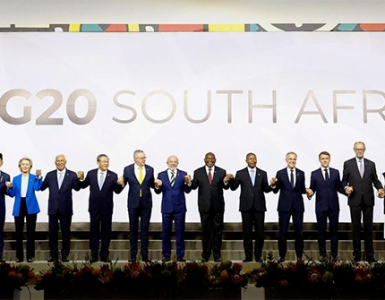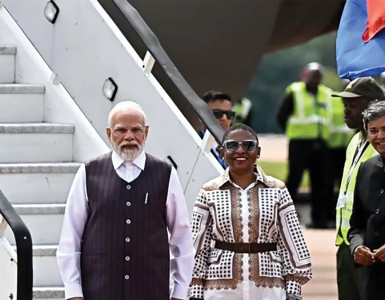FORGIVENESS: Germany’s Frank-Walter Steinmeier confronts his country’s brutal legacy which was crowned by mass murder of between 200 000 and 300 000 indigenous people in the east African country…
By DW Correspondents
German President Frank-Walter Steinmeier on Wednesday asked for forgiveness for crimes committed during the country’s colonial rule in Tanzania. “I would like to ask for forgiveness for what Germans did to your ancestors here,” Steinmeier said during a visit to the Maji Maji Museum in the southern Tanzanian city of Songea. Tanzania was part of German East Africa.
“I want to assure you that we Germans will search with you for answers to the unanswered questions that give you no peace,” he added.
Experts estimate between 200 000 and 300 000 members of the indigenous Tanzanian population were murdered during the so-called Maji Maji Rebellion uprisings between 1905 and 1907. The Germans quashed the uprising “with extreme brutality, using scorched-earth tactics to starve localities into submission,” according to the Oxford Research Encyclopedias.
Seen as one of the bloodiest uprisings in colonial history, German troops participated in the systematic destruction of fields and villages. Speaking of the “shame” felt towards the events, Steinmeier said Germany was ready to work with Tanzania towards a “communal processing” of the past.
The president promised to share the stories he learned at the Maji Maji Museum with the people of Germany, adding, “What happened here is our shared history — the history of your ancestors and the history of our ancestors in Germany.”
On Tuesday, on the second day of Steinmeier’s three-day trip to Tanzania, the German president said Germany would consider “the repatriation of cultural property and human remains.” Germany held several colonies from 1884 until the end of World War I. These included territories in modern‑day Tanzania, Burundi, Rwanda, Namibia, Cameroon, Togo and Ghana.
Meanwhile, an impressive, yet painful reminder of the ups and downs of German-Tanzanian relations can be found in the Museum of Natural History in the German capital. The 150-million-year-old dinosaur skeleton — one of the tallest mounted dinosaur skeletons in the world — dominates the Berlin museum’s central atrium.
In the early 1900s, German paleontologists and their African helpers excavated it near Tendaguru Hill, a region famous for its fossils, in the Lindi region in present-day Tanzania. The skeleton has thrilled school classes and visitors to Berlin since it was first displayed in 1937, but few are aware of its history.
The dinosaur is also on the travel list of Tanzanian historian Philemon Mtoi, who believes the skeleton came to Berlin illegally. “This animal is not originated from Germany. So I think it should be displayed in its country of origin,” Mtoi said, adding that it was one of the very special animals in the world.
“It will attract a lot of people. A lot of people are coming to see the display of this animal in the Berlin museum. It does not benefit the country where it was taken first.” Since his childhood, Mtoi has heard discussions in his home country about the possible repatriation of fossils and other natural and cultural artefacts that Germany collected.
These are “very important discussions,” Mtoi told DW. Such discussions are an “opportunity to have a dialog which will end up in a positive way,” he said. “But if people don’t discuss, the environment will be very hostile for these two parties.”
Germany has recently been trying to tackle this aspect of its colonial legacy. Foreign Minister Annalena Baerbock travelled to Nigeria last December to return Benin Bronzes to Nigeria. The 21 artefacts had been looted by British soldiers from the Kingdom of Benin, now in Nigeria, and were then sold to German museums. These are the first of 1 130 Benin Bronzes that Germany promised to return.
 The German colonial government also “stole the skeletons of thousands of the dead from cemeteries in order to measure and collect them,” a government website admits.
The German colonial government also “stole the skeletons of thousands of the dead from cemeteries in order to measure and collect them,” a government website admits.
Around 200 skulls will be returned to Tanzania, as well as more than 900 to Rwanda, which along with Burundi and small parts of northern Mozambique, made up German East Africa.
Historian Jürgen Zimmerer, a professor at the University of Hamburg, said he finds it interesting that after “decades of colonial amnesia and the refusal to take colonialism, colonial violence, colonial crimes and injustice seriously,” Germany has changed its heart. “But Germany focuses on the area of museums and art, it returns objects,” he said. “What it wants to avoid is recognizing the structural, racist nature of colonialism as such, because that raises very fundamental questions about reparations, about apologies.”
German politician Sevim Dagdelen, a member of the opposition Left Party, also thinks Germany should be doing more to examine its legacy in East Africa between 1885 und 1918.
“Anyone who, like Chancellor Olaf Scholz, proposes a new start in relations with African states mustn’t try to sit out the political and legal processing of colonial crimes,” she said.
One of Dagdelen’s central questions, however, remains unanswered. She had asked whether German colonial troops’ bloody suppression of the Maji Maji rebellion in southeastern Tanganyika could be described as genocide from today’s perspective.
A precedent for this is Germany’s official acknowledgment in 2021 that it committed genocide during its colonial occupation of Namibia when it massacred the Herero and Nama peoples in the early 1900s.
For Sevim Dagdelen, however, exploring whether a genocide took place is part of a constructive and goal-oriented dialogue. She also wants the government to learn from its mistakes in dealing with Namibia.
While both Germany and Namibia have made a joint declaration about the Herero and Nama genocide, the Namibian government is yet to ratify it. That’s because the descendants of the genocide victims want direct reparations, rather than the R20 billion promised to the Namibian government.
With regards the Maji Maji killing fields, some scholars have found strong evidence to support a claim of genocide in Germany’s conduct in Tanzania.
While the German government admitted in its parliamentary answer to being aware of the nature of the Maji Maji crackdown, it dodged the question of genocide. Instead, it said it faces up to its “moral and political responsibility” and referred to “trustful discussions” with the Tanzanian government.
“From the beginning, the German government, in close coordination with the government of Tanzania, should also genuinely take into account the descendants of the victims or the communities particularly affected by the genocide and seek dialogue,” Dagdelen said.
Historian Jürgen Zimmerer believes the German government is avoiding the issue because it is worried about setting a precedent. “People are afraid of precedents when they officially acknowledge colonial violence in connection with reparations or apologies,” he told DW, noting that there are demands for reparations from World War II. So the outcomes of ongoing debates on recognizing colonial injustice are being watched very closely.
“The German government thought it could sweep Namibia under the rug, [but] it can’t do that,” he said. “And now, it wants to avoid a repeat of Namibia at all costs, in that it won’t admit anything that in any way has similarities with Namibia — with the genocide back then — or could be construed in that way.”
Tanzanian historian Mtoi, however, said he considers it inappropriate to wait for such demands to be made. Instead, Germany should make a clear signal of reconciliation, he said, because if Berlin hesitates now, it will strain relations for years.
Mtoi proposes a joint commission incorporating historians and academics from the former colonial countries.
“Germany is one of the strongest nations in the world,” he said, and many countries look to it as an example. “It is not bad to say sorry. It does not show that you are weak. It shows that you are responsible for the humanities in the world.” – Additional reporting by DP and AFP

































